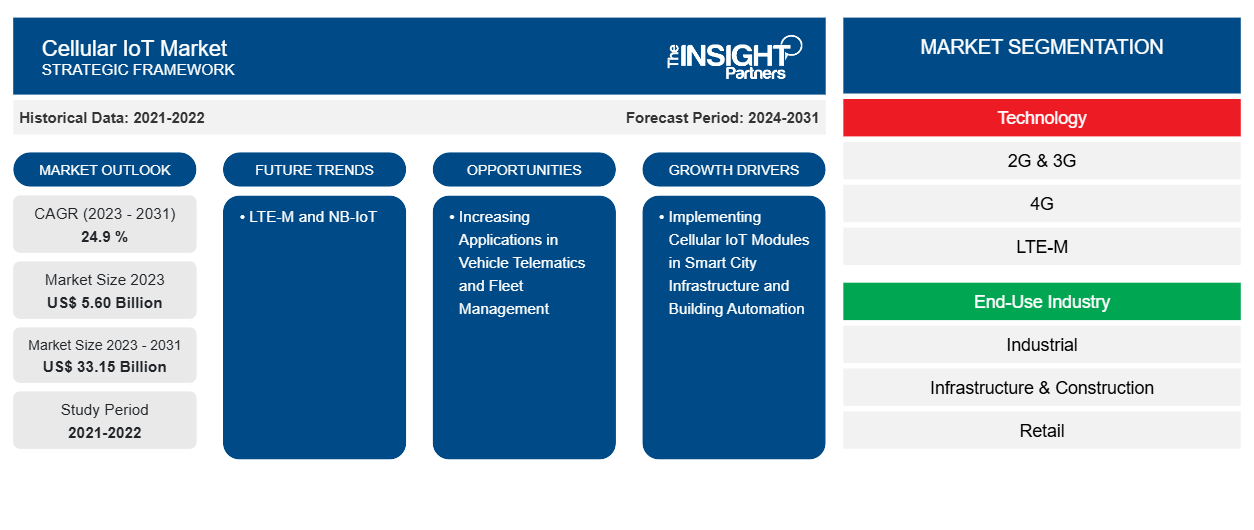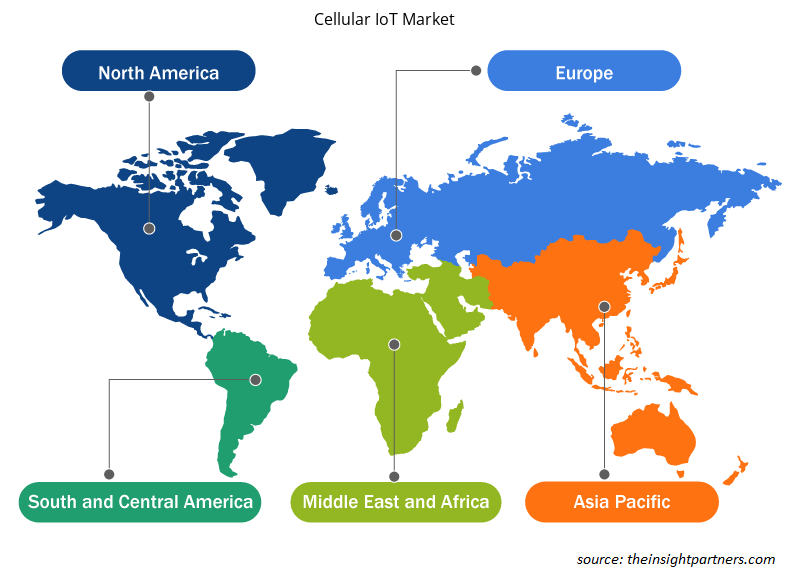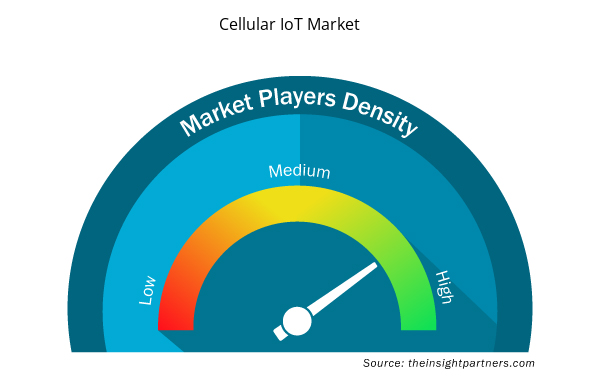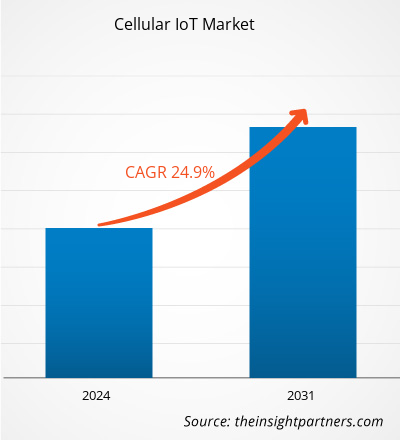The cellular IoT market size is projected to reach US$ 33.15 billion by 2031 from US$ 5.60 billion in 2023. The cellular IoT market is expected to register a CAGR of 24.9 % in 2023–2031. Cellular IoT modules are increasingly being used in smart city infrastructure and building automation, as well as in agricultural automation and environmental monitoring, driving market expansion.
Cellular IoT Market Analysis
Cellular IoT can manage the very sensitive and unique requirements of complicated applications and settings, as well as the more basic needs of the massive IoT market. There are two primary types of cellular IoT: Long Term Evolution for Machines (LTE-M) and Narrowband Internet of Things (NB-IoT). Examples of NB-IoT and LTE-M applications include precision agriculture, smart cities, vending machines, fleet monitoring, and others, all of which present considerable prospects for cellular IoT market share. These applications require long-distance communication that is both reliable and secure.
Cellular IoT Market Overview
The presence of quickly growing nations, rising acceptance of advanced technologies, and an growing number of connected devices are among the primary reasons projected to drive the global expansion of cellular IoT. The global cellular IoT market is predicted to grow due to increased digitalization and automation in industries such as automotive, manufacturing, and energy & utilities. Increased demand for extended network coverage, improved inclination toward business development beyond mobile broadband, and the need to accommodate a huge number of connected devices among businesses worldwide are all anticipated to drive the size of the cellular IoT market.
Customize This Report To Suit Your Requirement
You will get customization on any report - free of charge - including parts of this report, or country-level analysis, Excel Data pack, as well as avail great offers and discounts for start-ups & universities
Cellular IoT Market: Strategic Insights

- Get Top Key Market Trends of this report.This FREE sample will include data analysis, ranging from market trends to estimates and forecasts.
Customize This Report To Suit Your Requirement
You will get customization on any report - free of charge - including parts of this report, or country-level analysis, Excel Data pack, as well as avail great offers and discounts for start-ups & universities
Cellular IoT Market: Strategic Insights

- Get Top Key Market Trends of this report.This FREE sample will include data analysis, ranging from market trends to estimates and forecasts.
Cellular IoT Market Drivers and Opportunities
Implementing Cellular IoT Modules in Smart City Infrastructure and Building Automation to Favor Market
Smart city building and infrastructure automation are the two most important vertical deployments of cellular IoT modules, accounting for the majority of the cellular IoT market's revenue. Battery-operated devices can now connect to the internet thanks to emerging cellular IoT technologies such as NB-LTE-M, NB-IoT, and 5G. These technologies connect devices more effectively than current 2G and 3G technologies, including smart parking and smart street lighting. Streetlights, traffic sensing and control devices, garbage management devices, and parking management devices are just a few of the many uses for cellular IoT in Smart Cities. Modern infrastructure improvements are a top priority for governments around the world, and several pilot projects are being launched to achieve this goal.
Increasing Applications in Vehicle Telematics and Fleet Management
Vehicle telematics is one of the most important new applications for cellular IoT, as it enhances performance and connection while utilizing an organization's resources. The trend of deploying telematics systems in off-highway and highway vehicles is expected to generate significant development potential. When it comes to off-highway equipment, such as cranes and excavators, with a limited number of professionals, time is critical. Implementing IoT and telematics solutions is necessary for monitoring equipment and on-road assets. As a result, telematics solution providers are incorporating cellular IoT modules into their product offerings, making it easy for fleet managers and off-highway vehicle OEMs to gather and analyze field data, trends, and problems.
Cellular IoT Market Report Segmentation Analysis
Key segments that contributed to the derivation of the cellular IoT market analysis are technology, deployment, end-use industry, and end user.
- Based on technology, the cellular IoT market is segmented into 2G & 3G, 4G, LTE-M, NB-IoT, and 5G.
- Based on the end-use industry, the cellular IoT market is segmented into industrial, infrastructure & construction, retail, consumer electronics, automotive & transportation, energy & utilities, healthcare, and others.
Cellular IoT Market Share Analysis by Geography
The geographic scope of the cellular IoT market report is mainly divided into five regions: North America, Asia Pacific, Europe, Middle East & Africa, and South America/South & Central America. Countries such as India and China have a huge number of semiconductor dealers. Furthermore, the growing entry of technology businesses in the region, as well as increased investment in IoT technologies, are projected to drive market expansion. Governments across Asian countries, such as India, are also interested in the cellular IoT industry and are implementing a number of smart infrastructure projects. The governments of India, Japan, China, Korea, Malaysia, and Singapore have advocated national cellular IoT policies.
Cellular IoT Market Regional Insights
Cellular IoT Market Regional Insights
The regional trends and factors influencing the Cellular IoT Market throughout the forecast period have been thoroughly explained by the analysts at Insight Partners. This section also discusses Cellular IoT Market segments and geography across North America, Europe, Asia Pacific, Middle East and Africa, and South and Central America.

- Get the Regional Specific Data for Cellular IoT Market
Cellular IoT Market Report Scope
| Report Attribute | Details |
|---|---|
| Market size in 2023 | US$ 5.60 Billion |
| Market Size by 2031 | US$ 33.15 Billion |
| Global CAGR (2023 - 2031) | 24.9 % |
| Historical Data | 2021-2022 |
| Forecast period | 2024-2031 |
| Segments Covered |
By Technology
|
| Regions and Countries Covered | North America
|
| Market leaders and key company profiles |
Cellular IoT Market Players Density: Understanding Its Impact on Business Dynamics
The Cellular IoT Market market is growing rapidly, driven by increasing end-user demand due to factors such as evolving consumer preferences, technological advancements, and greater awareness of the product's benefits. As demand rises, businesses are expanding their offerings, innovating to meet consumer needs, and capitalizing on emerging trends, which further fuels market growth.
Market players density refers to the distribution of firms or companies operating within a particular market or industry. It indicates how many competitors (market players) are present in a given market space relative to its size or total market value.
Major Companies operating in the Cellular IoT Market are:
- Arm Holdings Plc
- AT&T, Inc.
- Ericsson
- Huawei Technologies Co., Ltd.
- Mediatek Inc.
- Qualcomm Incorporated
Disclaimer: The companies listed above are not ranked in any particular order.

- Get the Cellular IoT Market top key players overview
Cellular IoT Market News and Recent Developments
The cellular IoT market is evaluated by gathering qualitative and quantitative data post primary and secondary research, which includes important corporate publications, association data, and databases. The following is a list of developments in the market:
- In May 2022, - Audi, offered an update on its collaboration with mobility platform Spoke and other partners to employ cellular vehicle-to-everything (C-V2X) technology to assist minimize accidents involving bicycles and vehicles. Furthermore, Audi worked with C-V2X, which uses LTE cellular signals and direct PC5 signals that do not require a cellular network to detect a cyclist.
(Source: Audi, Press Release, 2022)
- In January 2023, Sierra Wireless announced the launch of Smart Connectivity Premium in the United States, which includes eUICC capabilities and expanded connectivity coverage. Furthermore, with its multi-IMSI, multi-profile design supported by GSMA eSIM (eUICC) requirements, Smart Connection Premium delivers resilient IoT-managed connection that is future-proofed across countries and technologies using a single global SIM.
(Source: Sierra Wireless, Press Release, 2023)
Cellular IoT Market Report Coverage and Deliverables
The "Cellular IoT Market Size and Forecast (2021–2031)" report provides a detailed analysis of the market covering below areas:
- Market size and forecast at global, regional, and country levels for all the key market segments covered under the scope
- Market dynamics such as drivers, restraints, and key opportunities
- Key future trends
- Detailed PEST/Porter's Five Forces and SWOT analysis
- Global and regional market analysis covering key market trends, major players, regulations, and recent market developments
- Industry landscape and competition analysis covering market concentration, heat map analysis, prominent players, and recent developments
- Detailed company profiles
- Historical Analysis (2 Years), Base Year, Forecast (7 Years) with CAGR
- PEST and SWOT Analysis
- Market Size Value / Volume - Global, Regional, Country
- Industry and Competitive Landscape
- Excel Dataset



Report Coverage
Revenue forecast, Company Analysis, Industry landscape, Growth factors, and Trends

Segment Covered
Technology ; End-Use Industry

Regional Scope
North America, Europe, Asia Pacific, Middle East & Africa, South & Central America

Country Scope
Argentina, Australia, Brazil, Canada, China, France, Germany, India, Italy, Japan, Mexico, Russian Federation, Saudi Arabia, South Africa, South Korea, United Arab Emirates, United Kingdom, United States
Frequently Asked Questions
The global cellular IoT market was estimated to be US$ 5.60 billion in 2023 and is expected to grow at a CAGR of 24.9 % during the forecast period 2023 - 2031.
Implementing cellular IoT modules in smart city infrastructure and building automation are the major factors that propel the global cellular IoT market.
LTE-M and NB-IoT are anticipated to play a significant role in the global cellular IoT market in the coming years.
The key players holding majority shares in the global cellular IoT market are Arm Holdings Plc., AT&T, Inc., Ericsson, Huawei Technologies Co., Ltd., and Mediatek Inc.
The global cellular IoT market is expected to reach US$ 33.15 billion by 2031.

 Get Free Sample For
Get Free Sample For